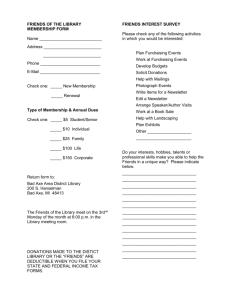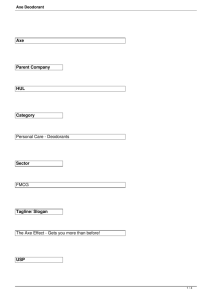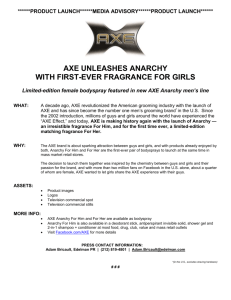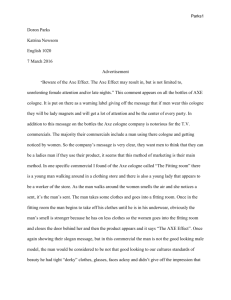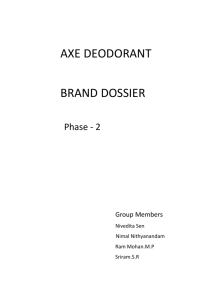Shayla Zimmerman English 1020- Project One AXE Advertising and
advertisement
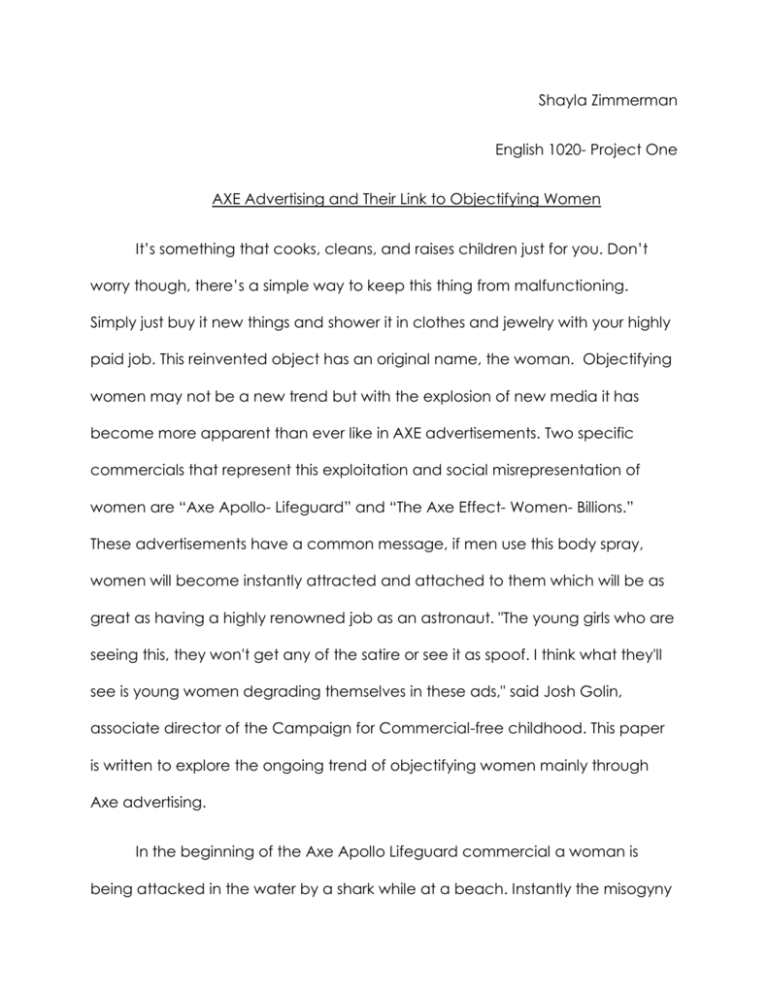
Shayla Zimmerman English 1020- Project One AXE Advertising and Their Link to Objectifying Women It’s something that cooks, cleans, and raises children just for you. Don’t worry though, there’s a simple way to keep this thing from malfunctioning. Simply just buy it new things and shower it in clothes and jewelry with your highly paid job. This reinvented object has an original name, the woman. Objectifying women may not be a new trend but with the explosion of new media it has become more apparent than ever like in AXE advertisements. Two specific commercials that represent this exploitation and social misrepresentation of women are “Axe Apollo- Lifeguard” and “The Axe Effect- Women- Billions.” These advertisements have a common message, if men use this body spray, women will become instantly attracted and attached to them which will be as great as having a highly renowned job as an astronaut. "The young girls who are seeing this, they won't get any of the satire or see it as spoof. I think what they'll see is young women degrading themselves in these ads," said Josh Golin, associate director of the Campaign for Commercial-free childhood. This paper is written to explore the ongoing trend of objectifying women mainly through Axe advertising. In the beginning of the Axe Apollo Lifeguard commercial a woman is being attacked in the water by a shark while at a beach. Instantly the misogyny begins as the male life guard dives into the water to save her. The life guard begins to beat up the shark by punching it and ultimately retrieves the woman from the water. This start to the commercial shows the audience the strong “manliness” of the stereotypical life guard. It gives an automatic theme that women are helpless and only a strong man can save them. The patriarchy between men and women is recognized and expected. The patriarchy is specifically that a woman is helpless and needs help, but only a man can help them. This is seen in media constantly based on unevolved world views that women are automatically the weaker sex. Therefore, the life guard is expected to save the helpless girl and it’s not just a coincidence the life guard is a man. During the middle of the commercial the life guard is shown carrying the damsel-in-distress out of the water and laying her onto the beach. The woman looks up to him as her hero and seems to almost want to kiss the life guard. This alludes to the audience that women can be won over simply by saving their life with their physical abilities. Saving lives is very heroic but the sexual appeal begins when the advertisement adds the “almost kissing” scene. It hands consumers the idea that the woman not only relies on men to save her life but is willing to thank him in a sexual manner. Sexual appeal is the basis of advertisements, “sex sells.” By adding this hint of sexual appeal the advertisement shifts the theme that women’s lives rely on men into when favoring a woman they will always give thanks in a sexual manner. The last few seconds of the commercial the woman is seen to look over to an astronaut walking towards her. The woman is shown to be instantly attracted to him as she runs toward him in just a bikini. And the patriarchy continues. While at first the woman is attracted to the life guard for his strong physical ability, her attention is easily changed when she realizes a man with a “better job” shows up. This section of the commercial is representing the evolution of “what a woman wants in a man.” According to menshealth.com, 35% of women want “Being Good in Bed” and 75% of women want dependability as traits in a man. “A woman knows that a man who takes care of her in bed will take care of her out of bed” Comments menshealth.com in the article “The Top 20 Traits Women Want in a Man.” Back in the Stone Age when strength was everything because money was not what supported a family, women wanted the strongest man. The stronger the man was, the more women were available to his picking. Now, strength is just a small factor but money is the key to a woman’s “heart.” Since women are only objects to be won. The best way to “win” women is to have a high paying job to keep them “satisfied.” This commercial demonstrated that idea by showing who the woman wanted more, the delightful smelling astronaut. Another prominent commercial for AXE is “The AXE Effect- WomenBillions” which presents a similar humorous sex appeal theme. In the beginning of the commercial you see a few women running dramatically and slowly through the woods in just bikinis. They’re clearly running towards something and wanting something in front of them. Then you begin to see hundreds of women running and swimming in only bikinis as their sex appeal is taken to an all-time high. Their bodies are aggressively in the audience’s face and their facial expression alone demonstrates a sexual manner. This objectification of women here is presenting them as savages as they sniff to find what they are looking for and running savagely through the woods. Here, in this Axe commercial the savageness of the women is the sex appeal. The last part of the commercial shows a man standing on a beach spraying AXE all over him. The audience soon realizes these women are running towards him and reaching for him as he sprays more and more of the AXE spray. “Spray more. Get more. The AXE effect” are the remaining words on the screen. AXE advertisements continue to present women as sexual maniacs when smelling Axe and they aggressively desire men who wear a lot of it. The theme is if you use more of the AXE spray, the more women will want you, and that makes you more of a successful man. These commercials have multiple conventions such as selling the Axe product Apollo and “empowering” men. Axe Company has spent $8.6 billion in 2013 for ads according to Advertising Age news, in attempt to sell men the idea women are objects to be won and can easily be won based on certain factors. These advertisements imply that women are controlled by scents, the man’s occupation, and the man’s physical appearance. The woman was easily “won” by the man in the astronaut suit that uses Axe cologne over the muscular life guard that saved her life. Patriarchy sells because the act of dominance sells. In a world when women have always been the less powerful or less dominating sex it is easier to sell products to consumers conditioned in these patriarchy views. According to “Brand Analysis- Axe- Consumer Behavior Theories” by Alena Kalkum 44% men answered “attraction” and 28% answered “freshness” when asked “When you think of Lynx, what comes to your mind first?” Lynx is a company mainly in developed countries, most popular in the UK, England, and America. Lynx is called Axe in America due to existing brands. “Axe’s marketing team must engage in constant sociological study. It must consider that, according to its research, the majority of college-aged males and only about a quarter of females consider themselves more attractive than average--and then act on that information” Reports Jason Feifer in the article “How Axe Built a Highly Scientific, Totally Irresistible Marketing Machine Built on Lust”. Axe tries to take their brand to a new level by putting a humorous twist to their exploitation of women. The question now arises, is there a way to sell Lynx products, such as AXE, to men that does not objectify women? While it has become the norm to exploit women in advertising only very few are taking a stand such as Dove or Nike. The consequences of objectifying women are clear as day. Many women have bought into the beauty industry’s image of perfect. Internal prejudice is taking extreme measures to despise something that identifies a person such as race or gender. Many women have eating disorders, get plastic surgery, dye their hair, etc. in order to reach societies image of desirable or perfect. “95% of those who have eating disorders are between the ages 12 and 25.8” according to the Anorexia Nervosa and Associated Disorders. That is the age most women and men are exposed most to media. But this is only one of the consequences based off of women exploitation in media. In conclusion, AXE is only one of the billions of companies that use humor and sexual appeal of women to sell their products. Companies like Carl’s Jr. and Beats Pill speakers have no issue exploitation and misrepresenting women in their advertising. The objectification of women has become easier and more acceptable than ever. Axe misrepresents women by convincing men it is greater to have many women and it’s very easy to accomplish this with the right cologne and job.
